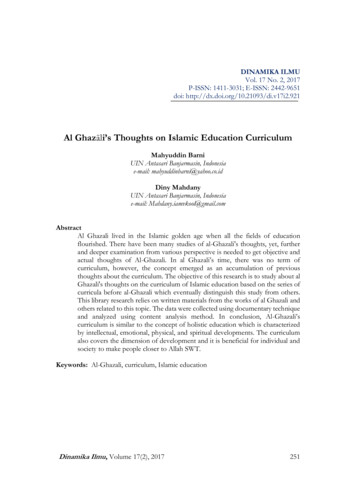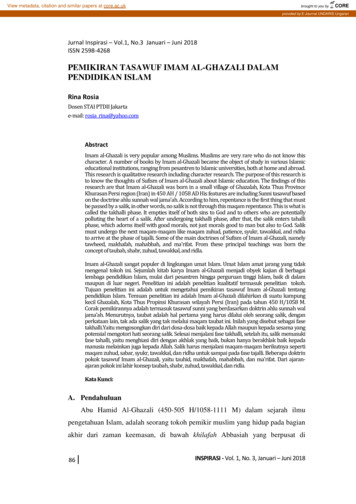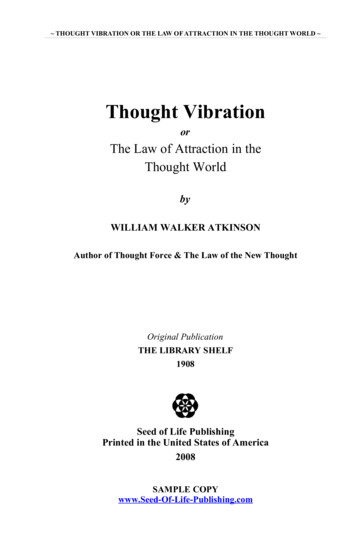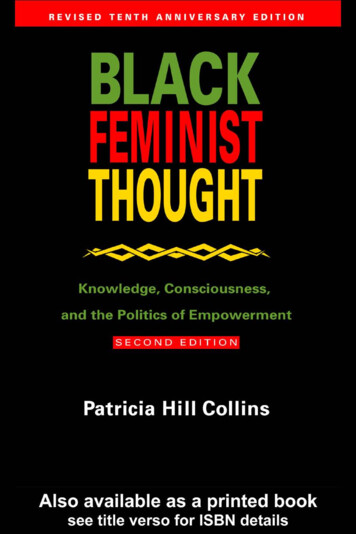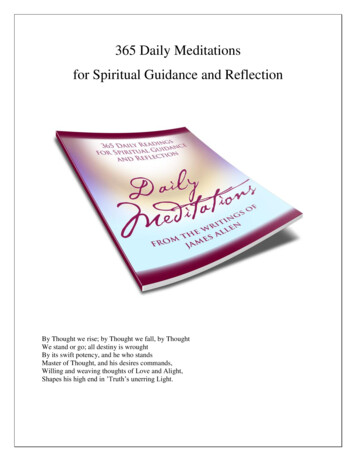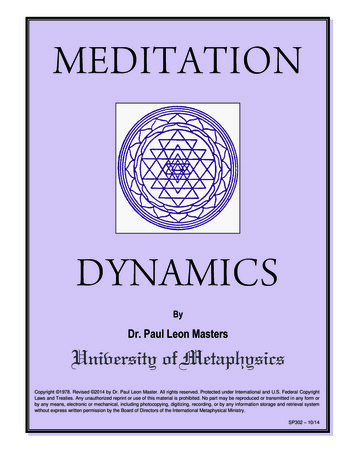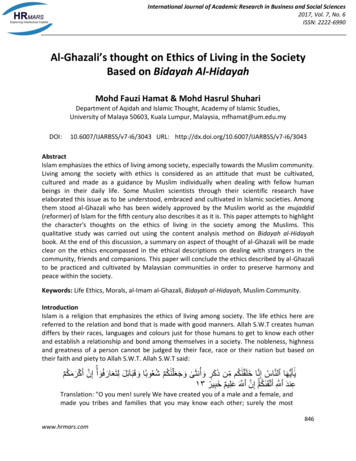
Transcription
International Journal of Academic Research in Business and Social Sciences2017, Vol. 7, No. 6ISSN: 2222-6990Al-Ghazali’s thought on Ethics of Living in the SocietyBased on Bidayah Al-HidayahMohd Fauzi Hamat & Mohd Hasrul ShuhariDepartment of Aqidah and Islamic Thought, Academy of Islamic Studies,University of Malaya 50603, Kuala Lumpur, Malaysia, mfhamat@um.edu.myDOI:10.6007/IJARBSS/v7-i6/3043 URL: ctIslam emphasizes the ethics of living among society, especially towards the Muslim community.Living among the society with ethics is considered as an attitude that must be cultivated,cultured and made as a guidance by Muslim individually when dealing with fellow humanbeings in their daily life. Some Muslim scientists through their scientific research haveelaborated this issue as to be understood, embraced and cultivated in Islamic societies. Amongthem stood al-Ghazali who has been widely approved by the Muslim world as the mujaddid(reformer) of Islam for the fifth century also describes it as it is. This paper attempts to highlightthe character's thoughts on the ethics of living in the society among the Muslims. Thisqualitative study was carried out using the content analysis method on Bidayah al-Hidayahbook. At the end of this discussion, a summary on aspect of thought of al-Ghazali will be madeclear on the ethics encompassed in the ethical descriptions on dealing with strangers in thecommunity, friends and companions. This paper will conclude the ethics described by al-Ghazalito be practiced and cultivated by Malaysian communities in order to preserve harmony andpeace within the society.Keywords: Life Ethics, Morals, al-Imam al-Ghazali, Bidayah al-Hidayah, Muslim Community.IntroductionIslam is a religion that emphasizes the ethics of living among society. The life ethics here arereferred to the relation and bond that is made with good manners. Allah S.W.T creates humandiffers by their races, languages and colours just for those humans to get to know each otherand establish a relationship and bond among themselves in a society. The nobleness, highnessand greatness of a person cannot be judged by their face, race or their nation but based ontheir faith and piety to Allah S.W.T. Allah S.W.T said: ارف َٰٓو ْۚا ِإ َّن أ َ ۡك َر َمك ۡم َ َيَٰٓأَيُّ َها ٱلنَّاس ِإنَّا َخلَ ۡقنَكم ِمن ذَ َك ٖر َوأنثَى َو َج َع ۡلنَك ۡم شعوبٗ ا َو َق َبا َٰٓ ِئ َل ِلتَ َع َّ ٱّللِ أ َ ۡت َقىك ْۡۚم ِإ َّن َّ َ ِعند ٣١ ير ٞ ع ِلي ٌم َخ ِب َ َ ٱّلل Translation: "O you men! surely We have created you of a male and a female, andmade you tribes and families that you may know each other; surely the most846www.hrmars.com
International Journal of Academic Research in Business and Social Sciences2017, Vol. 7, No. 6ISSN: 2222-6990honorable of you with Allah is the one among you most careful (of his duty);surely Allah is Knowing, Aware.”(al-Hujurat 49:13)Al-Baghawi (1997) explains that the word 'dhakarin wa untha' in this verse refers to theProphet Adam and his wife Saidatina Hawa. Thus, this means that all human are theirdescendant, saying that all human beings are related by blood. While the word 'lita arafu'means that they are to know each other either near of far from the descendants of ProphetAdam with no intention to boast about their own race.Islam requires unity among human, especially upon the muslim community. The ProphetP.B.U.H said: ول هي ضى لَ ُك ْم أَ ْن اَّللُ َعلَْي يه َو َسله َم إي هن ه صلهى ه ُ ال َر ُس َ َ ال ق َ َ َع ْن أيَِب ُهَريْ َرَة ق َ فَيَ ْر . ضى لَ ُك ْم ثَََلثًا َ اَّللَ يَ ْر َ اَّلل اَّللي َي تَعب ُدوه وََل تُ ْش يرُكوا بييه َشيئًا وأَ ْن تَعتَ ي َج ًيعا َوََل تَ َفهرقُوا ص ُموا يِبَْب يل ه ْ َ َْ ُ ُْTranslation: "From Abu Hurayrah R.A. had said: said the Prophet MuhammadS.A.W: Indeed with Allah three things for you. so He bless you to worship Him,and for you to serve no one except Him and to hold on to the rope of Allah S.W.Tsolely and you shall scattered. " (Muslim, 2000)Al-Nawawi (1972) described that the phrase "hold on to the rope of Allah S.W.T" in thehadith refers to making the Quran as a guidance, know its limits, and act with its nobility. Whilethe terms 'unbreakable' refers to the order to apply unity in the congregation of Muslims andkeep the bond within (amr bi luzum jama ah al-muslimin wa taalluf ba dihim bi ba d). Thisshows that the interconnected bond among people through interaction between them are oneof the basis of unity that need to be addressed. The bond must be plaited with manners andmorals to guarantee the unity. This paper chooses to elaborate on al-Ghazali's way of thinkingon the life ethics among the society, especially among the Muslim community through his book,Bidayah al-Hidayah and study its suitability as a guideline for the community and the state ofMalaysia. Before that, some explanations will be made on al-Ghazali and his book for a smoothread ahead.Al-Ghazali and His BookHe is Abu Hamid Muhammad ibn Muhammad ibn Muhammad ibn Ahmad al-Tusi al-Shafi i andwas born on the 450H in Tus. Al-Ghazali, the son of Imam al-Haramayn al-Juwayni, masteredknowledge in various fields, thus called as an Islamic argumentist (hujjat al-Islam). He hadwritten reports in various fields of study and his councils were attended by famous scholars.This famous scholar practiced al-Shafi i in and stood with al-Asha'irah. According to Yusuf alQaradawi, his mastery in various fields of knowledge and honor given to him , hujjah al-Islam,encourages the historians (muarrikhin) and hadith scholars (muhaddithin) to agree withoutdoubt that he is the mujaddid (reformer) in that century (fifth century). Al-Ghazali died at the847www.hrmars.com
International Journal of Academic Research in Business and Social Sciences2017, Vol. 7, No. 6ISSN: 2222-6990age of 55 years on Monday, 14th Jamadil Akhir 505H and was buried in Tus (Ibn Kathir, 1998;Ibn al- Imad, 1989; al-Madkur, 2009; al-Qaradawi, 1994).Muhammad Uthman al-Khasht, as one of those who study the book of Bidayah alHidayah, explained that al-Ghazali wrote the book of Bidayah al-Hidayah while he was in thelast phase of his life that is the phase of sanctity where in this phase, he had matured inthought and heart. Abd al-Rahman Badawi and he cited Maurice Bouyges's view that this bookwas written between 488H and 499H (al-Ghazali, 1985; Badawi, 1977). The contents of thisbook are divided into three parts namely al-Ta'at (obedience), al-Ma'asi (disobedience) andAdab al-Suhbah (ethics in relationship). Muhammad Uthman has listed two books of syarah toBidayah al-Hidayah book which is al-Kifayah written by 'Abd al-Qadir ibn Ahmad al-Faqih(982H) and Maraqi al- Ubudiyyah written by Muhammad al-Nawawi al-Jawi Al-Makki (1897M)(al-Ghazali, 1985). In Malay world of Islam, besides Muhammad al-Nawawi, there was anotherMalay scholar who had contributed to join the force by translating and lecturing the text and heis Shaykh Abd al-Samad al-Falimbani in his report entitled Hidayah al-Salikin (al-Fatani, 2002, p.65).The Concept of Ethical Living In Society According to al-Ghazali'Ethics' means; first, referring to knowledge of moral or moral principles, secondly, referring tothe principle of moral (or akhlaq) or moral values that became a guidance towards an individualor a group such as association, occupation and others. While the meaning of the word 'life' is;first, to keep on living and breathing (on humans, animals and others); and grow (on plants).Secondly, it means to sit (stay or make somewhere home). Third, it means to earn a living in acertain way. Fourth, it means it is still moving or working (regarding organizations, companiesand others). Meanwhile, the meaning of the word 'socialize' is to live or to join as a societywhile the word 'society', means a group of people living together in a place with certain rulesand regulations (Kamus Dewan, 2005). Hence, the meaning of ‘ethics of living among society'refers to the moral or moral values practiced by a group of people living and interacting orsocializing in a society.The ethical living among society’s concept according to al-Ghazali (1999) can beunderstood based on the term al-suhbah which he uses in his reports such as Ihya Ulum al-Din.Al-Suhbah (friendship) refers to the interaction of fellow human beings in societies, sittingtogether (al-mujalasah) and neighboring or mixed (al-mujawarah). Al-Suhbah is divided intotwo. Firstly, the ‘al-suhbah’ which occurred randomly due to neighborhood interaction or dueto meeting in the office, school, market, or when meeting leaders, traveling or others. Secondly,the ‘al-suhbah’ which is planned by Allah S.W.T who urges His servants to strengthen eachother's brotherhood. Human interaction can occur when someone interested to someone else.On the other hand, this interaction would not happen if someone does not interested toanyone around, even when a situation occur he will avoid to associate to anyone that he doesnot like or interested with. These interactions occur among people based on the level oflikeness in them toward others. There are likely four levels which is;848www.hrmars.com
International Journal of Academic Research in Business and Social Sciences2017, Vol. 7, No. 6ISSN: 2222-69901) Loving someone for himself/herself.2) Loving someone for the benefits within that person.3) Loving someone to get rewards in the hereafter.4) Loving someone solely because of Allah S.W.T and this is the greatest.Al-Ghazali (2003) lists in his book, al-Arba in fi Usul al-Din, that ethics of humaninteraction is included in the list of forty things that are the basis of the religion. As for theperson who strive to achieve happiness in Allah S.W.T’s rahmah, it is necessary to hold on tothe ten fundamental points in ‘aqidah and keep on practicing, externally and internally.External practice is divided into ten basic points, whereas the eighth principle is to fulfill therights of all Muslims and interact with them well (al-qiyam bi huquq al-muslimin wa husn alsuhbah ma ahum). Meanwhile, the internal practice is described into twenty points namely tenmatters concerning the purification of the heart and ten matters relating to self-deception withnoble behaviour. This suggests that the ethics of living among society refers to the ethics andmorals that need to be implemented whenever human are socializing and interacting witheach other in a society. It is part of the religion and must be exercised to seek the guidance ofAllah S.W.T and become a pious Muslim. The best communication ethics is to communicate asto achieve the pleasure and guidance from Allah S.W.T. Moving to the next sub-topic, the ethicsmention earlier will be explained.Manners Based On The Ethics Of Living In The SocietyThe ethics of living in society is explained by al-Ghazali (1985) in the third part of Bidayah alHidayah's book. After describing the manners of an individual with Allah S.W.T, manners of apious person, manners of a student and manners of a child to its parents, he listed the mannersor ethics of an individual to the whole human being. Al-Ghazali divides the entire human intothree groups namely majahil (anonymous), asdiqa' (friends) and ma arif (known people). Thedetails are as follows:a) Ethics in dealing with the Unknown (al-majahil)In short, al-Ghazali (1985) only lists five manners or ethics when one deals with people who donot recognize them. The five manners are:1) Do not join people that talk nonsense or on unbeneficial issues.2) Do not hear bad words.3) Do not mind the words of those who want to do bad things to you.4) Do not hang out too much and seeking for help from them.5) Do advise them on their misbehaviors wisely but make sure that they are willing toaccept the advice.b) Ethics on Dealing with the Companion (al-asdiqa')849www.hrmars.com
International Journal of Academic Research in Business and Social Sciences2017, Vol. 7, No. 6ISSN: 2222-6990Al-Ghazali (1985) explains that when one wants to find a friend, it is necessary to consider twothings: ways to choose friends and how to fulfill their rights. One needs to find a worthycompanion where he is willing to lend a hand in any matters be it in study, religion and theworld. Such kind of friend can be identified based on five criteria. First is a sensible person.Taking in an ignorant people as a a friend will only spark fights and hates. Their acts or wordsused might harm other person even though he has no intention of doing it. As a matter of fact,it is better to befriend with someone wise and intellectual than the ignorant one. Second is anoble person. Someone who behave badly most of the time cannot control himself, neither hisanger nor his desire. The qualities that usually found in good companion is helpful, alwaysencouraging towards good things , dare to feel pain, paying deeds, taking into account all thegoodness that is given, covering all the bad qualities seen and many more.Third is a good friend. People who are fasiq are people who are not afraid of Allah S.W.Tand certainly not to be trusted. Befriended with a fasiq person might led someone to take sinslightly as for the fasiq it is a common thing. Thing such as gossiping considered common as a lotof people doing it without realizing that they are in a great sin upon Allah S.W.T. Fourth is adown-to-earth friend (humble). The person who takes worldly life as a priority will definitelyinfluence others to prioritized the world as he/she is. So, by befriending a humble person, anindividual will eventually be affected by its humbleness. The fifth is a true friend. A liar is mostlikely to cheat his companion or even his best friend. However, al-Ghazali (1985) understandsthe reality of the society in which one finds it difficult to meet the perfect companion thoughhe/she always studying the religion and worshiping in the mosque. When that happens, oneneeds to choose one of two things. First is to isolate ourselves from the public to be safe fromall their bad intentions. The second is to interact with them based on their three respectivecriteria:1) The friend for the hereafter in which a person should take him/her as an example inpreparing for the hereafter. It's like the basic needs for us human beings.2) Friends of world affairs whereas only their manners (akhlaq) is taken to be applied.It’s like a drug that is only needed at a certain time.3) A friend who can entertain the heart where one should keep noted from the evil,defamation and bad intentions so that they can be avoided. It's like a disease that noone wants. However, when inevitable situation occur, one should take it as anexperience and a guidance for the future’s sake.After a relationship had bonded, one must comply with the rights of the relationship byexercising some manners. The manners are as follows (al-Ghazali, 1985; al-Ghazali, 1998):1) Prioritize your friends beyond yourself in financial affairs even though you yourselfneeds it too. If you cannot afford that, then offer a sum of money to the friend so thatwhatever good could be done.2) Lend a hand to help a friend before they start seeking for help.850www.hrmars.com
International Journal of Academic Research in Business and Social Sciences2017, Vol. 7, No. 6ISSN: 2222-69903) Hide all the companion’s secrets, cover his shame and when others criticize him, donot tell him the negative comments.4) When someone praises the friend, it is important to let he/she informed about it,listen diligently as the friend speaks and do not cut his/her sentences.5) Calling the friend by his favorite name, praising his kindness, thanking him for all thekindness he has given, preventing others from harassing him like he does and advisinghim gently with reasonable arguments.6) Forgiving all the faults of the companions and do not defraud them.7) Forgiving friends while they are alive and after their death.8) Do good to friend's family members after his/her death.9) Relieves the burdens of companions and do not burden them for them to be happy,feeling pleasure when friends are happy and sad when they are in any kind of sadness .10) Giving greetings when meeting the friend and offering a seat.11) Moving the seat if needed to offer the friend one and accompany him/her to thedoor as a matter of respect.12) Be quiet when friend is talking and do not interrupt the conversation unless youropinion are demanded.Generally, al-Ghazali (1985) explains that one needs to treat friends like how oneselfwant to be treated. If one does not love friend as he loves himself, the ukhuwwah (orfriendship) is considered munafiq (or hypocritical) and that will lead to destruction in the worldand in the hereafter. In conclusion, a person's friendship in a society needs to be based on fivecriteria of worthy qualities of being a friend or at least three of the best criteria and twelvemanners that need to be exercised when interacting with a friend.c) Ethics on Dealing with Non-Companion Individuals (al-ma arif).According to al-Ghazali (1985), a crime usually occurs between a person and other personknown. It does not usually happen to best friends as real friends help each other to keep thefriendship strong. This would not occur between a person and a complete strangers as theycertainly would not interfere with other persons’ affair. If no disturbance on one’s affair, thenno dispute created. The point is, it is unpleasant when someone take their friendship lightly byexpressing gratitude in their relation only with meer interacts . Al-Ghazali suggests to keep agood distance from this kind of people. However, it is inevitable that situations like meetingthem at school, mosque or market could occur and interaction are needed then there are somemanners that need to be exercised. They are:851www.hrmars.com
International Journal of Academic Research in Business and Social Sciences2017, Vol. 7, No. 6ISSN: 2222-69901) Do not insult or bash these persons because one do not exactly know them by heart,there is a chance that they are better than they look (in terms of morality, knowledgeand so on).2) Do not glorify them too much for their property as it might destroy a person bypersonality. Allah S.W.T will look down on those who look up to those who are given theblessings of the world. People who are given the honor in the world will also look downto someone that dare to sacrifice religion for the sake of world pleasures.3) Do not respond to their animosity as it will destroy the religion.4) Do not become a liker only after being praised and bribed and do not feel puzzled anddo not scowl them if insulted.5) Do not let you greed swoon over their property, position and assistance. When givenhelp, be grateful to Allah S.W.T and thank the Samaritan. If no help offered, do not letanger consumed you, do not critics and do not spread hate to others.6) Offer advice only if it is likely acceptable to the listener. When advice offered to thewrong person at the wrong time, not only it is not taken but it might also sparks conflict.When they misunderstood something and do not want to be advised, just let them be.Unless the misunderstanding is caused by ignorance and might let them astray if ignoredthen they need to be advised wisely.7) When you saw them doing good to someone then thank Allah S.W.T. But when theydo evil then let their affairs to Allah S.W.T and pray to Allah S.W.T to keep them fromtheir evil. If insulted do not say: "Do you even know me [that you dare to insult]?" Thisis because, perhaps the humiliation is a redemption for sin that has been done orperhaps it is a test. Therefore, one need to seek for forgiveness to Allah S.W.T whenhumiliated.8) Listen to the good thing that is being said and spread the goodness while on the otherhand, ignore the bad conversation and do not spread it.9) Face them, whether they are good friend or not, with a smile, use good words and behumble. Do not insult and feel proud, instead treat them with honor.10) Be careful when associating with the fiqh elitist nowadays, especially the one thatkeen to (or fond of) disagreements and debates. This is because most of them areoftenly associates with maliciousness, making claims based on their poor judgment,spreading shame, collecting and exploiting others' mistakes, throwing false claims, lyingand pretending in front others. Interacting with them will only resulted in devastationand humiliation. Only the people who are protected by Allah S.W.T will be save from thisfitnah.852www.hrmars.com
International Journal of Academic Research in Business and Social Sciences2017, Vol. 7, No. 6ISSN: 2222-699011) Smile, humble and modest when doing something.12) Do not feel full of yourself and do not mingle with the crowd unless there is a need.13) When sitting in the crowd, avoid raising legs, tossing fingers, stroking beard,touching teeth, playing with nose, spitting, shooing the flies, stripping and yawning infront of people, whether during prayers or other situations.14) Calmly sit back with them, speech needs to be neat and understandable. Listenattentively to their story without obviously expressing wilderness if puzzled and do notask them to repeat it.15) Avoid mentioning own success or blessing such as children’s success, poem, talks,writing or any personal affairs to others.16) Do not dress neither like a woman nor like a slave, do not excessively apply eyelinerand too much perfumes.17) Do not force others to fulfill own wishes or encourage others to commit crime.18) Do not let anyone know the actual property owned either to family members or thepublic. If the amount is not as much then people will only look down to you. If it is a lot,surely some of them might fell dissatisfied with what is given. One need to be firm butgentle when involving family members.19) When disagreed with the opinion stated, one should act noble, do not act foolishand spoiled, less hand moves, avoid turning backwards and do not sit on your knees andbeg. One should only speak when his/her heart has begun to calm down.20) When one is near to a king, try to imagine the danger (of his position) as if he wereat the edge of a sword.21) Be cautious as there are people who want to be friends only when it is easy. He/shemight turn into enemy anytime.In a nutshell, the living ethics in society according to al-Ghazali refers to the mannersthat need to be exercised by a person when interacting with three groups of people; stranger,close friends, and people who are known but not too close. Based on al-Ghazali’s thought, onewill know how to differentiate between true friends and a fake one. True friends will definitelyhelp in education, worldly affair and religion affair. When interacting with people who do notperfected the criteria as true friends, one shall refer to the guideline stated by al-Ghazali whichdivides them into three groups, that is those who are to be observed and followed by hisreligion (deen), those who are to be observed and followed by their manners (akhlaq) andthose who need to be taken precautionary measures to not be affected by their ignorance.These criteria and guidelines need to be embraced and cultivated by the community in order to853www.hrmars.com
International Journal of Academic Research in Business and Social Sciences2017, Vol. 7, No. 6ISSN: 2222-6990strenghten the bond made with no hostility, no unbeneficial argument and nothing towards thebad side.The Suitability Of Al-Ghazali's Thinking In MalaysiaAl-Ghazali's thinking is appropriate to be practiced and learnt among Malaysians, especially themajority of the Muslim community. This is because the Muslim community in Malaysia hasbeen exposed widely to the influence of al-Ghazali's thought through the seminars andscripture councils. So, they are easy to accept and practice al-Ghazali's way of thinking. Theproof is that there is a educational-chain linking the ulama in the Malaya with al-Ghazali.Ahmad al-Qushashi and Ibrahim al-Kurani were among the scholars who linked al-Ghazali'sthinking to the Malay scholars back at the days. For example, among the Malay scholars whostudied with al-Kurani was Shaykh Abd al-Ra'uf Singkel. Shaykh Muhammad Yasin al-Fadanialso lists the books of al-Ghazali such as Ihya’ 'Ulum al-Din, Minhaj al-'Abidin, Bidayah alHidayah and al-Hikmah fi Makhluqat Allah that were accepted through his teacher, ShaykhMuhammad Ali al-Maliki that is linked to Shaykh Ahmad al-Ramli based on sanad al-Kurani toal-Ghazali (Abdullah, 2004).In 1778M, Shaykh Abd al-Samad al-Falimbani translated and described the bookBidayah al-Hidayah in his work entitled Hidayah al-Salikin (al-Fatani, 2002). Raja Ali Haji alsocontributed in spreading al-Ghazali's thinking, especially those that contained in Ihya’ 'Ulum alDin, Minhaj al- Aididin and Bidayah al-Hidayah into the Malay world as for example through hispoetic masterpiece entitled Gurindam Dua Belas (Watson, 1979; Sham, 2004). The bookBidayah al-Hidayah was also lectured by a Malay scholar named Muhammad al-Nawawi al-Jawial-Makki in his work, Maraqi al- Ubudiyyah (al-Ghazali, 1985). According to Hamka (1977), alGhazali's thought through his book, Ihya’ 'Ulum al-Din greatly influenced the Malay community.He acknowledged that his work entitled Tasawwuf Moden (1939M), the Lembaga Hidup(1940M) and the Lembaga Budi (1940M) was influenced by al-Ghazali's thinking through Ihya’'Ulum al-Din, Minhaj al-'Abidin and Bidayah al-Hidayah (Sham, 2004).After understanding the reality of the Malaysian society, especially the Muslims who arealready familiar with al-Ghazali's thinking, it is important that al-Ghazali's ideas are to be spreadamong Malaysians more systematically. Al-Ghazali's thinking particularly with regard to theethics of living in society should be taught at school, university and applied by the governmentin programs aimed at unity between races and communities. At school level, these manners(adab) exposure to young learners in moral, ethics and religious subjects will spark the seeds ofunity between them. At the university level, al-Ghazali's thinking can be applied in the syllabusof akhlaq and morals courses, especially in the Ethnics Relation, Islamic and Asian Civilizationscourses (TITAS) which have become compulsory courses at universities. This is to ensure thatthe living ethics in society could be educationally discussed and cultivated by educated and wiseyoungsters whom soon to be the future leaders of Malaysia. This will complement the masteryof the living ethics in society, from the book of Bidayah al-Hidayah which is not only taught at854www.hrmars.com
International Journal of Academic Research in Business and Social Sciences2017, Vol. 7, No. 6ISSN: 2222-6990the musolla, mosque or pondok-styled-insitution but is also studied and cultivated by universitylevel students.At the government level, the Department of National Unity and Integration (JPNIN), oneof the department under Prime Minister's Department, is a significant official department ofunity and social relations. This is because the vision of this department is to be the lead agencyto preserve, enhance and strengthen the unity and harmony of society in Malaysia. UnderJPNIN, there is an institute called the Institute of Research and Training of National Integration(IKLIN) which is established to promote the sharing of knowledge, ideas, training, research aswell as the concept of lifelong learning to cultivate knowledge and education in the field ofNational Unity and Integration. IKLIN also embarked on trainings, researches and developments(R & D) and also approaches smart collaboration between local and international universitiesalong with the aspiration to be a center of excellence in lifelong learning and to create greatbrilliant and glorious human beings. IKLIN was established along with the intention to produce aunited Malaysian nation. This statement is for the need of Malaysians from all levels tounderstand this pure means intrested within that with given the knowledge in the fieldsrequired (Department of National Unity and Integration, http://www.jpnin.gov.my/ms/info jpnin / profile # visions, July 4, 2017; Department of National Unity and nancial-integration-national-international, July 4, 2017).Thus, government departments like this and the likes could apply the living ethics in society intraining programs, education and the like based on al-Ghazali's thinking for the purpose ofeducation and cultural among Malaysians in more comprehensive and systematic ways.ConclusionThe living ethics in society refers to ethics that need to be cultivated when human beings areinterconnected in a society. It is part of important practices in the forty religious foundationsthat must be exercised by particular Muslim individuals to seek the guidance of Allah S.W.T. Fora Muslim, the best ethics in relationship is a relation that is based on achieving the pleasure andguidance of Allah S.W.T. The living ethics in society is to be implemented by one wheninteracting with the three groups of people which is; stranger (al-majahil), friends (al-asdiqa’),and known person but not too close (al-ma arif). These are the guidelines to be embraced andimplemented by members of society so that the relationship will be stronger and towardsargument-free and disagreement-free relation. The manners in the living ethics in societyaccording to al-Ghazali's thinking is appropriate and easy to cultivate in Malaysia. This isbecause al-Ghazali's teachings have been commonly taught in musolla, mosques and pondokstyled institution by the speakers and teachers who teach the book of Bidayah al-Hidayah sincethe early of Islam. Therefore, al-Ghazali's thought should be recommended to be officiallytaught at the school, university level and programmed and organized by the government to becultivated by the Malaysian community for example through the Department of National Unityand Integration (JPNIN) or the like to make
2017, Vol. 7, No. 6 ISSN: 2222-6990 849 www.hrmars.com 1) Loving someone for himself/herself. 2) Loving someone for the benefits within that person. 3) Loving someone to get rewards in the hereafter. 4) Loving someone solely because of Allah S.W.T and this is the greatest.
